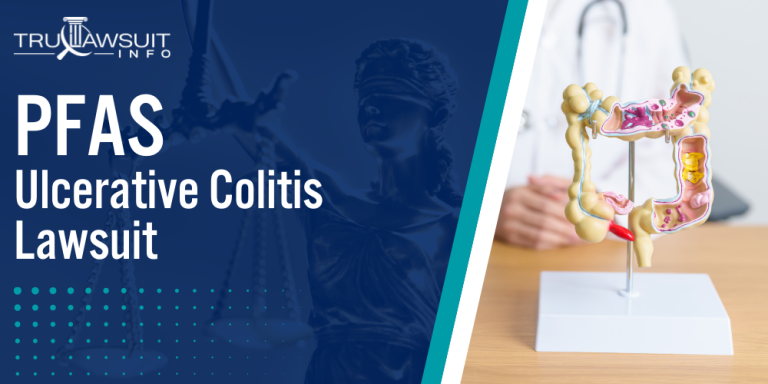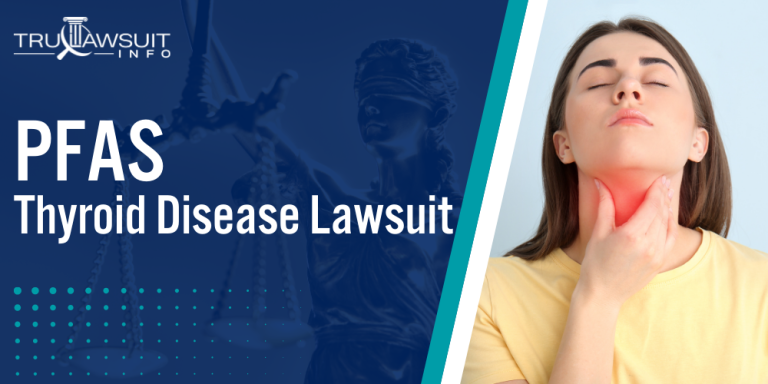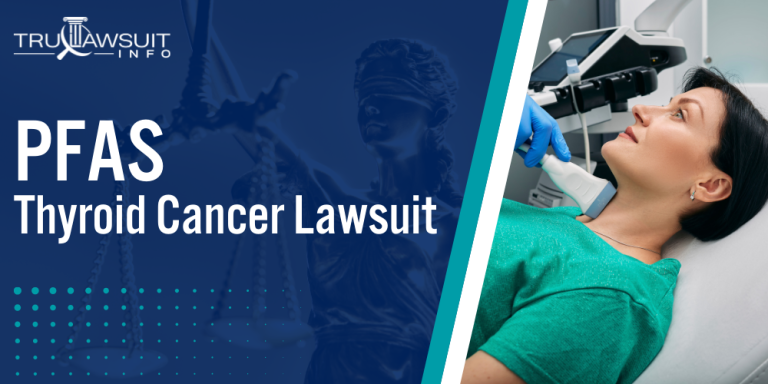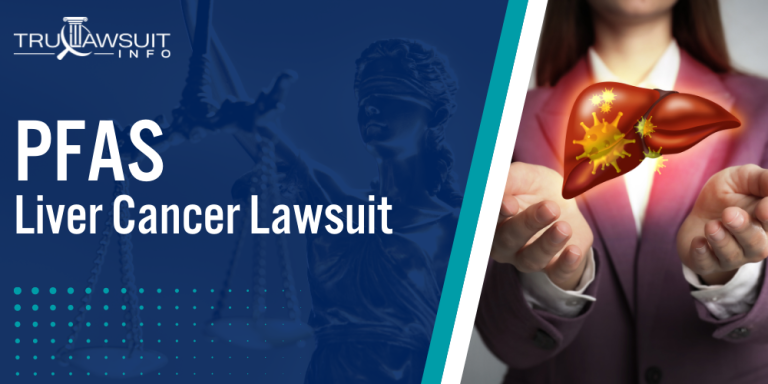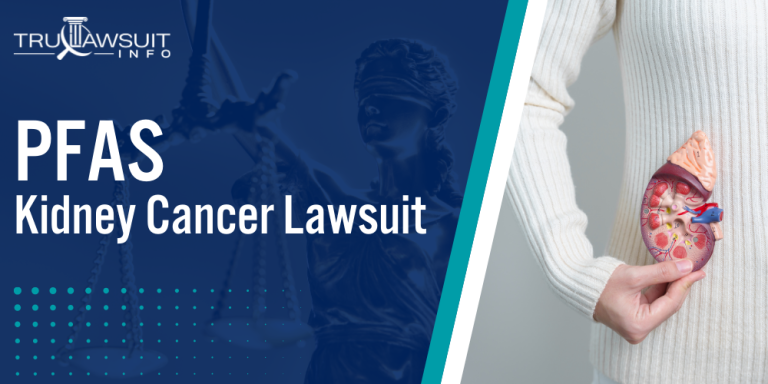Proving Causation in a Social Media Mental Health Lawsuit
Key Takeaways:
- Social media mental health lawsuits allege that platforms like Facebook and Instagram were negligently designed to be addictive and harmful to users' mental health, especially vulnerable youth.
- To prove causation, plaintiffs must present compelling evidence directly linking social media use to psychological harm, such as expert testimony, user data analysis, and documentation of mental health declines over time.
- As litigation evolves, courts will grapple with balancing user protection and free speech rights, while collaboration between legal and mental health experts can drive awareness and support for those harmed by social media addiction.
Overview of the Social Media Mental Health Lawsuit
On this page, we’ll discuss proving causation in a Social Media Mental Health Lawsuit, challenges establishing a link between social media use and mental health issues, gathering evidence for a Social Media Mental Health Lawsuit, and much more.
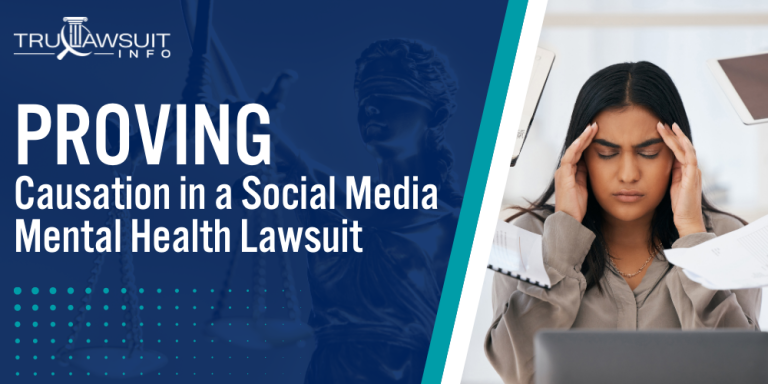
Intro to the Social Media Mental Health Lawsuit
A significant legal action known as the Social Media Mental Health Lawsuit has garnered attention, implicating major social media companies in contributing to the mental health crisis among youth.
Key Points in the social media addiction lawsuit include, but are not limited to:
- Allegations of harm to young people’s mental health through the platforms’ design and algorithmic choices.
- A bipartisan coalition of attorneys general has filed these social media lawsuits.
- Claims that companies prioritized profit over safety, possibly neglecting the well-being of their younger user base.
- Initiatives by cities like New York and a multi-state coalition aiming to hold social media companies accountable.
If you or a loved one has experienced mental health issues potentially related to social media use, you may have a case for compensation.
Contact TruLawsuit Info using the chat feature on this page for a free case evaluation to determine if you qualify for a social media mental health lawsuit.
Table of Contents
The Rise of Social Media and Mental Health Concerns
As social media platforms become increasingly integral to daily life, the implications for mental health have become a pressing issue.
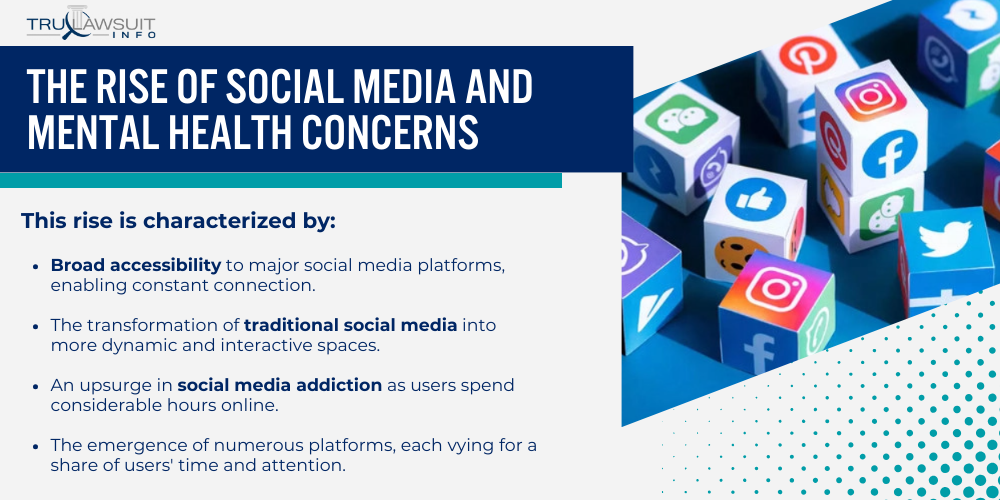
The connection between social media usage and mental health challenges, particularly among young individuals, is drawing attention across various sectors.
Increasing Use of Social Media Platforms
Social media has grown exponentially, becoming a central hub for communication, entertainment, and information sharing.
This rise is characterized by:
- Broad accessibility to major social media platforms, enabling constant connection.
- The transformation of traditional social media into more dynamic and interactive spaces.
- An upsurge in social media addiction as users spend considerable hours online.
- The emergence of numerous platforms, each vying for a share of users’ time and attention.
Growing Evidence Linking Social Media to Mental Health Issues
Recent findings continue to illuminate the potential risks that social media poses to mental health, highlighting a troubling trend across various age groups.
These insights draw a clear line connecting the dots between frequent social media engagement and increased psychological distress.
Research and reports are increasingly finding connections between social media use and mental health concerns:
- Studies point to an association between time spent on social media platforms and mental health problems such as anxiety and depression.
- There is noted concern for a youth mental health crisis, where young users experience body image issues and eating disorders correlated with social media consumption.
- Discussions around the childhood mental health crisis often include the intense use of social media by younger demographics.
- Efforts are underway to understand and address the ways social media can contribute to a widespread mental health crisis.
Legal Basis for Social Media Mental Health Lawsuits
Social media companies are facing increasing scrutiny and legal action for their platform designs and features that may impact the mental health of users, especially younger audiences.
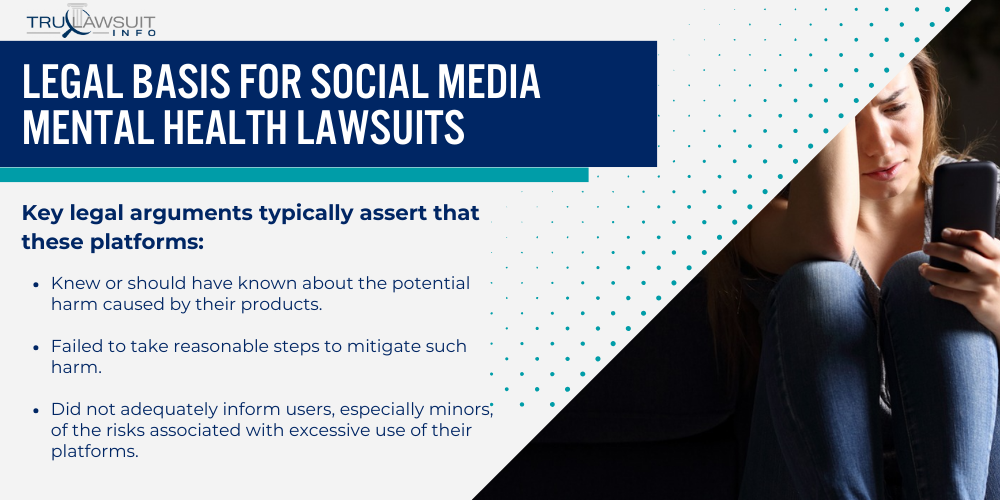
Negligence and Failure to Warn Claims
Social media giants may be seen as neglecting the duty of care towards their users.
Key legal arguments typically assert that these platforms:
- Knew or should have known about the potential harm caused by their products.
- Failed to take reasonable steps to mitigate such harm.
- Did not adequately inform users, especially minors, of the risks associated with excessive use of their platforms.
- Lacked transparent and effective parental controls or age-appropriate experiences online.
Product Liability and Design Defect Arguments
As courts grapple with increasing claims against social media companies, the debate intensifies over whether the design of these platforms contributes directly to user harm.
Critics contend that the intricate features and algorithms of social media not only captivate users but also expose them to significant psychological risks.
The core of product liability suits is often that social media apps are inherently defective, leading to legal challenges focused on:
- The intentional design of features that are claimed to create addictive behaviors.
- The deployment of algorithms favoring prolonged engagement over user safety.
- The absence of industry-leading safeguards to protect children and user well-being.
- The insufficiency of age-restricted features in preventing access by younger users.
Critics argue that these elements, designed into the very fabric of social media, reflect a general disregard for the potential negative consequences on mental health.
Establishing Causation in Social Media Mental Health Cases
In the realm of social media mental health litigation, demonstrating causation is a pivotal aspect.
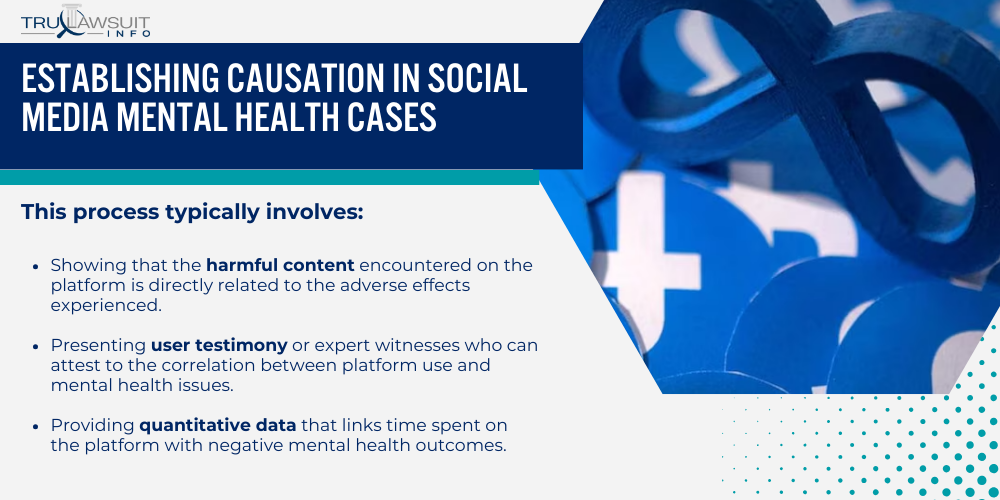
Establishing a legal connection between social media platform use and psychological harm is the foundation for these cases.
Demonstrating a Direct Link Between Platform Use and Harm
To demonstrate a direct link, plaintiffs must present evidence that social media use has directly resulted in harm.
This process typically involves:
- Showing that the harmful content encountered on the platform is directly related to the adverse effects experienced.
- Presenting user testimony or expert witnesses who can attest to the correlation between platform use and mental health issues.
- Providing quantitative data that links time spent on the platform with negative mental health outcomes.
- Documenting changes in mental health status before and after extensive use of the social media platform.
Overcoming Challenges in Proving Causation
Demonstrating the direct impact of social media on mental health presents a formidable challenge in courtrooms, as concrete evidence is often hard to pinpoint.
Plaintiffs must navigate a maze of subjective user experiences and elusive scientific proof to establish a clear link between social media usage and psychological harm.
In taking legal action, plaintiffs face several hurdles when trying to prove causation in social media mental health cases:
- Variability in Individual Experiences: Given that users may react differently to social media content, establishing a one-size-fits-all causation becomes difficult.
- Lack of Direct Evidence: Concrete proof directly linking social media use to negative impacts can be elusive.
- Combatting Claims of Personal Responsibility: Defending against arguments that users have control over their media consumption and its effects.
- Addressing the influence of external factors that may contribute to mental health issues, thereby complicating the causal relationship.
In each of these situations, the goal is to link social media’s negative impact with the harm claimed in numerous lawsuits.
Establishing this connection is key to holding platforms accountable through legal action.
Expert Testimony in Social Media Mental Health Lawsuits
Expert testimonies play a pivotal role in legal actions involving social media’s impact on youth mental well-being.
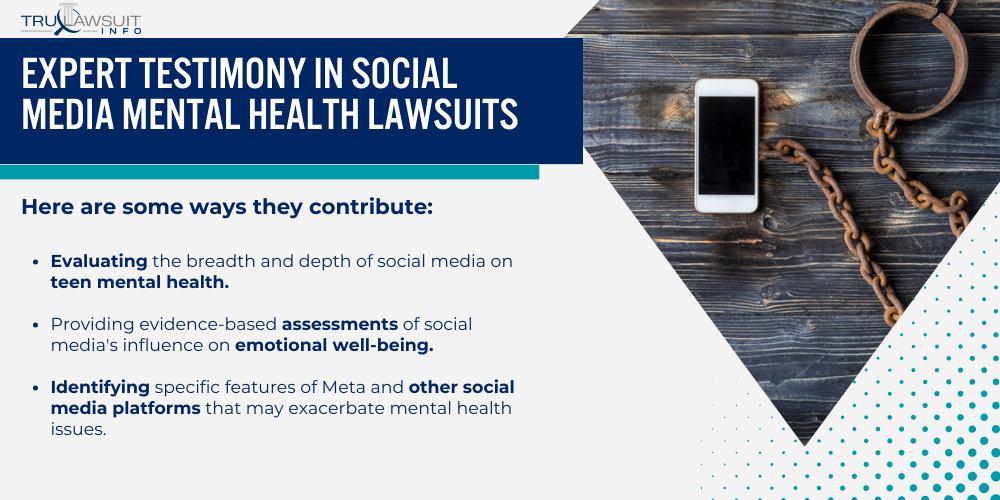
Professionals in mental health and technology are often called upon to present insights based on evidence and industry practices.
The Role of Mental Health Professionals
Mental health professionals offer critical analyses in social media addiction lawsuits regarding the psychological effects of social media on teenagers.
Here are some ways they contribute:
- Evaluating the breadth and depth of social media on teen mental health.
- Providing evidence-based assessments of social media’s influence on emotional well-being.
- Identifying specific features of Meta and other social media platforms that may exacerbate mental health issues.
- Recommending safeguards and youth mental health programs to aid youth mental health.
Their testimonies shed light on the need for supportive measures to improve youth well-being.
New York City spends more than $100 million on youth mental health programs and services each year.
New York City health programs are designed to address a variety of challenges that young people face, ranging from anxiety and depression to more severe mental health issues.
Utilizing Social Media and Technology Experts
Social media and technology experts dissect the technical aspects of platforms and algorithms.
Here’s what they typically focus on:
- Analyzing user engagement tactics that major tech companies may employ.
- Critiquing the design choices that lead to increased screen time among youth.
- Exploring the accountability of tech giants in user data exploitation and privacy.
- Offering insights into potential reforms that could mitigate harm to younger users.
Their insights are essential to understanding how platform mechanics correlate with user mental health outcomes.
Gathering Evidence to Support Causation Claims
The evaluation of evidence in social media mental health lawsuits is a meticulous process.
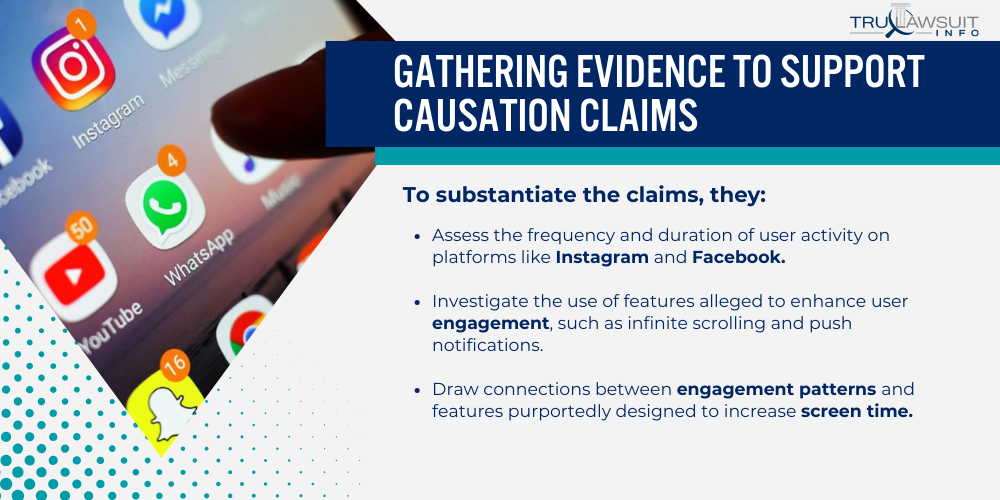
It involves examining granular user data and capturing shifts in mental health over time.
Analyzing User Data and Engagement Patterns
Prosecutors gather detailed user engagement data to demonstrate how Meta’s algorithms may be engineered to foster addictive behaviors.
To substantiate the claims, they:
- Assess the frequency and duration of user activity on platforms like Instagram and Facebook.
- Investigate the use of features alleged to enhance user engagement, such as infinite scrolling and push notifications.
- Draw connections between engagement patterns and features purportedly designed to increase screen time.
- Examine internal Meta documents, possibly through discovery, to reveal the company’s awareness and intentions.
Documenting Changes in Mental Health Over Time
Tracking the long-term effects of social media on mental health requires meticulous documentation and analysis, as patterns may evolve or only become apparent over extended periods.
Legal professionals and researchers alike gather data and case studies that demonstrate a correlation between prolonged social media exposure and psychological issues.
To link social media use with deteriorating mental health, legal teams must:
- Compile longitudinal studies that track participant mental health indicators in relation to their social media usage.
- Include testimony from mental health professionals who have treated patients for issues correlated with social media use.
- Highlight cases from school districts or cities like New York City, where the public hospital system announced concerns over youth mental health potentially linked to social media.
- Substantiate claims with peer-reviewed research that could suggest causation between social media use and mental health decline.
Potential Defenses in Social Media Mental Health Lawsuits
In the intricate landscape of legal challenges against social media companies, the defenses presented hinge on points of law and user conduct.
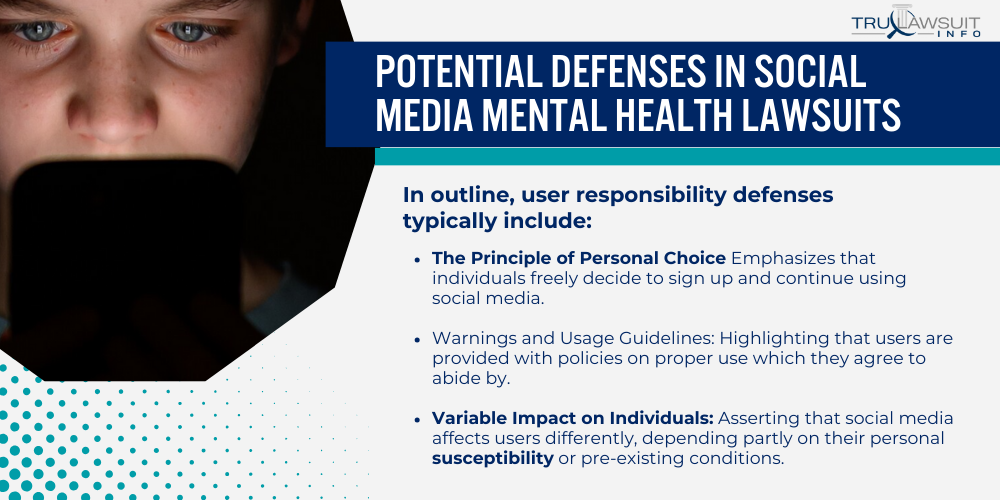
These strategic defenses can define the outcomes of lawsuits pertaining to mental health claims.
User Responsibility and Individual Susceptibility Arguments
Social media companies often argue that users are responsible for their online activity, including the choice to engage with social media platforms.
In outline, user responsibility defenses typically include:
- The Principle of Personal Choice Emphasizes that individuals freely decide to sign up and continue using social media.
- Warnings and Usage Guidelines: Highlighting that users are provided with policies on proper use which they agree to abide by.
- Variable Impact on Individuals: Asserting that social media affects users differently, depending partly on their personal susceptibility or pre-existing conditions.
- Consultation with Guardians: Stressing the role of parents or guardians in monitoring their children’s online interactions to protect them.
Section 230 of the Communications Decency Act
Under Section 230, social media platforms are generally not held liable for the content that users post.
Key aspects of this defense include:
- Protection of Free Speech: Section 230 supports free speech online, allowing users to express themselves without platforms bearing the responsibility.
- Distinction Between Publisher and Platform: This legal distinction is vital, situating social media as facilitators rather than publishers of content.
- Encouragement for Self-Regulation: Platforms are often better supported online for efforts to regulate harmful content without fear of liability.
- Precedent in Case Law: Past rulings have upheld that Section 230 provides broad protections for internet companies against a range of legal claims.
Successful Social Media Lawsuit Precedents
The precedent set by notable litigation demonstrates that social media companies can be held accountable for their impact on users’ mental health.
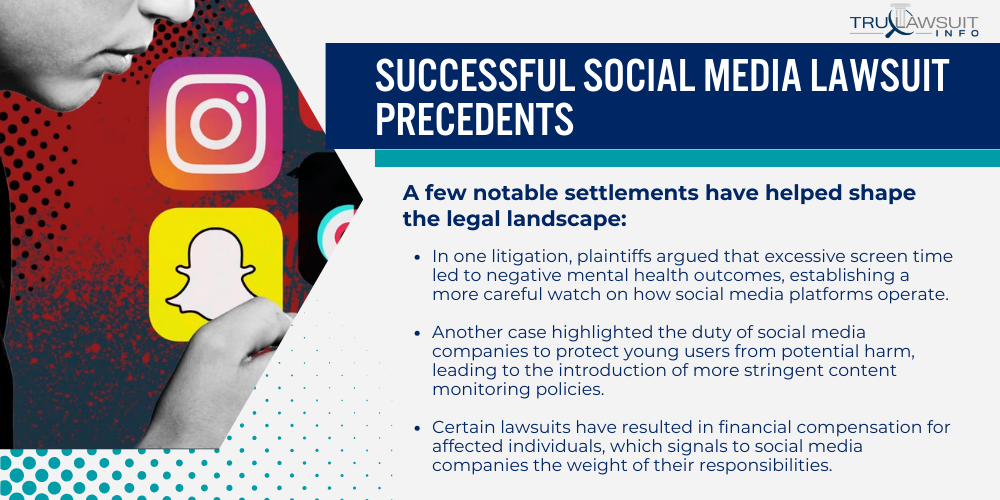
Landmark Cases and Settlements
Landmark cases have seen social media entities face substantial repercussions for their platforms’ effects on users’ mental health.
A few notable settlements have helped shape the legal landscape:
- In one litigation, plaintiffs argued that excessive screen time led to negative mental health outcomes, establishing a more careful watch on how social media platforms operate.
- Another case highlighted the duty of social media companies to protect young users from potential harm, leading to the introduction of more stringent content monitoring policies.
- Certain lawsuits have resulted in financial compensation for affected individuals, which signals to social media companies the weight of their responsibilities.
- There are critical instances where extensive legal scrutiny has catalyzed platform changes to enhance user safety and well-being.
Lessons Learned from Previous Litigation
The history of legal battles involving social media platforms sheds light on crucial shifts within the industry, especially concerning the handling of user data and engagement strategies.
These legal challenges have highlighted the need for social media companies to adopt more ethical practices and to take a proactive stance on user safety.
Previous litigation has provided valuable insights into managing responsibilities within social media companies:
- Investigations have underscored the importance of transparency in platform algorithms and their potential effects on user engagement and addiction.
- The legal outcomes have emphasized the need for rigorous research into social media’s impact on young people’s mental health, leading to more informed discussions about potential harm.
- Accountability measures, such as regulations and monitoring, have become more pronounced following lawsuits, aiming to lessen the negative effects of social media usage.
- An emerging priority for platform design is the balance between user engagement and mental well-being, which must be reflected in the user experience.
The Future of Social Media Mental Health Litigation
The escalation of litigation around social media’s impact on mental health signals a transformative period ahead.
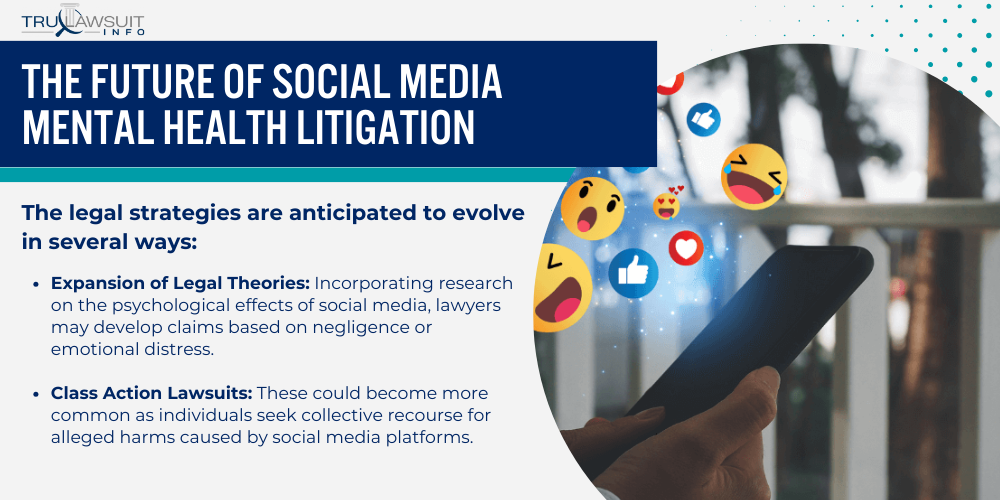
Attorneys are preparing novel legal approaches, and lawmakers are examining pertinent reforms to address the challenges posed by these platforms.
Evolving Legal Strategies and Theories of Liability
Bold efforts by social media attorneys to hold major social media companies accountable have led to a broad spectrum of liability theories.
The legal strategies are anticipated to evolve in several ways:
- Expansion of Legal Theories: Incorporating research on the psychological effects of social media, lawyers may develop claims based on negligence or emotional distress.
- Class Action Lawsuits: These could become more common as individuals seek collective recourse for alleged harms caused by social media platforms.
- Targeting Algorithms: Litigators are scrutinizing how algorithms might contribute to addiction or deteriorate users’ mental health, leading to novel legal challenges.
- Incorporation of Data Privacy Issues: Future lawsuits could also examine the intersection of mental health impacts and user data exploitation.
Potential Legislative and Regulatory Changes
With heightened scrutiny, potential legislative and regulatory changes are on the table to usher in a new era of responsibility for other social media companies as well.
Legislative and regulatory bodies may consider the following:
- Protective Legislation: New laws could mandate age verification, stricter parental controls, and transparency in algorithms to safeguard youth mental health.
- Increased Oversight: Regulators may intensify scrutiny of social media practices and their compliance with existing laws surrounding consumer protection and health.
- Standard Setting: Benchmarks for safe design and operation might be established, requiring social media platforms to demonstrate adherence as a condition of operation.
- Enforcement Mechanisms: To deter harmful practices by these platforms, penalties, including fines and restrictions, could be strengthened.
As the unfolding legal landscape adapts to these digital challenges, stakeholders, including mental health advocates and industry players, are paying close attention.
Free Speech and User Protection in Social Media Regulation
Regulating social media calls for a careful balance between protecting free speech and ensuring user safety, especially the well-being of younger audiences.
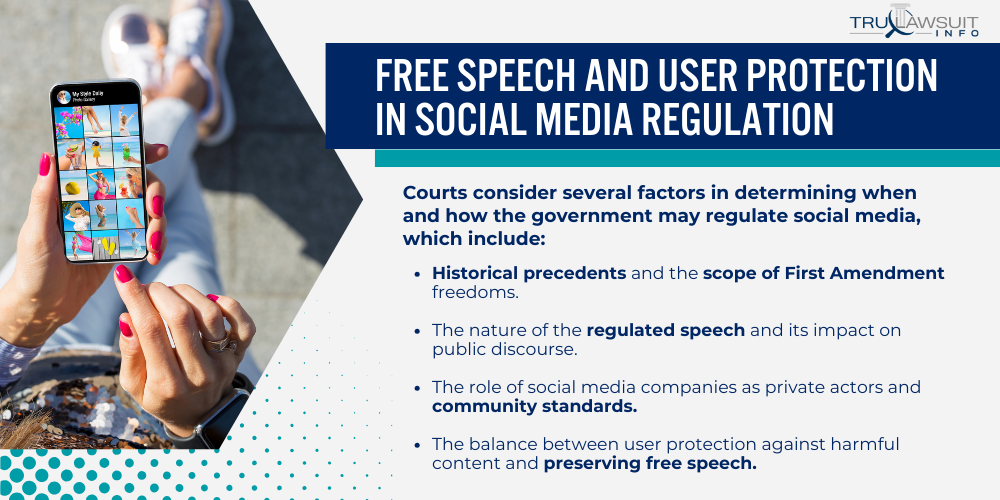
Policymakers and platform developers alike face significant hurdles in addressing these imperatives.
First Amendment Considerations in Platform Liability
First Amendment protections in content regulation on social media platforms present nuanced legal challenges.
Courts consider several factors in determining when and how the government may regulate social media, which include:
- Historical precedents and the scope of First Amendment freedoms.
- The nature of the regulated speech and its impact on public discourse.
- The role of social media companies as private actors and community standards.
- The balance between user protection against harmful content and preserving free speech.
In essence, not every regulation that affects social media content aligns with the principles set forth by the First Amendment.
Responsible Design Practices and Safeguards
Social media platforms can promote user well-being by adopting responsible design practices.
Some of the recommended safeguards include:
- Implementing effective content moderation tools to filter out harmful content.
- Offering clear and accessible privacy settings to users for enhanced control.
- Creating alert systems for potentially dangerous situations or content.
- Supporting teens’ well-being by providing age-appropriate content and interactive elements.
Platforms must balance these design considerations with the need to uphold free speech while taking into account the industry-wide challenges of moderating vast amounts of user-generated content.
Advocating for Increased Research and Awareness
The legal actions against social media companies highlight the essential need for further research and heightened awareness on how social media impacts the mental health of adolescents.
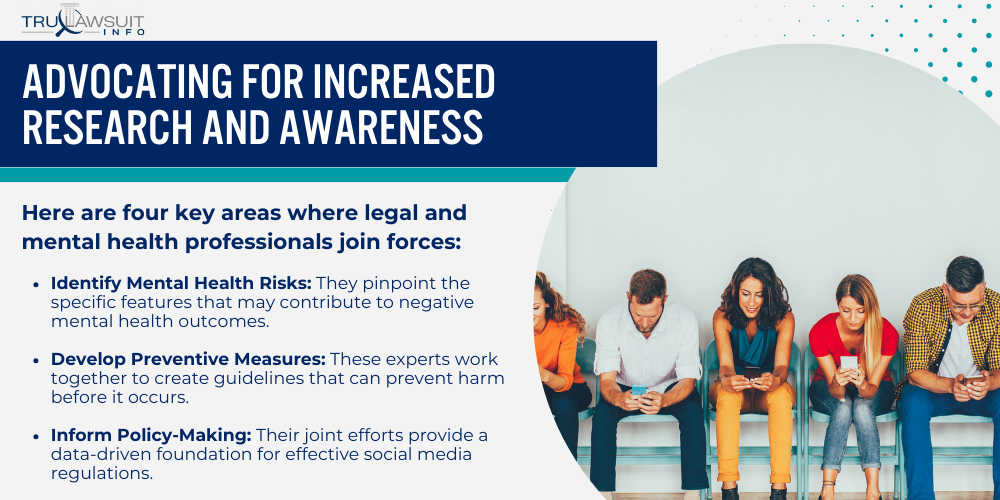
Collaboration Between Legal and Mental Health Experts
Collaboration between legal professionals and mental health experts is paramount to understanding and mitigating the risks social media poses to young users.
Here are four key areas where legal and mental health professionals join forces:
- Identify Mental Health Risks: They pinpoint the specific features that may contribute to negative mental health outcomes.
- Develop Preventive Measures: These experts work together to create guidelines that can prevent harm before it occurs.
- Inform Policy-Making: Their joint efforts provide a data-driven foundation for effective social media regulations.
- Support Legal Arguments: Mental health research bolsters legal cases, illustrating the causal links between social media usage and mental health issues.
Public Education on Social Media’s Mental Health Impact
Educating the public, especially adolescents, about the potential mental health impacts of social media is critical.
Key educational strategies include:
- Highlight Known Dangers: Enlighten young people about the risks of excessive social media use.
- Promote Healthy Usage: Teach strategies for managing time on social media to reduce negative effects.
- Increase Digital Literacy: Help users understand and navigate the social media environment with greater awareness.
- Engage Caregivers and Educators: They play a crucial role in reinforcing healthy social media habits among young people.
TruLawsuit Info: #1 Social Media Addiction Lawyers
In the online world, concerns have been amplifying over the impact of major social media companies on users’ mental health.
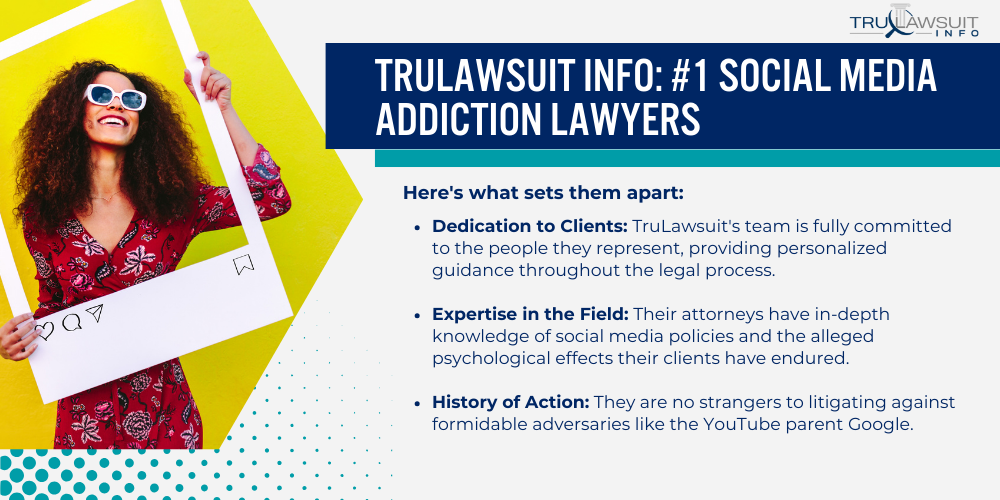
Over the past decade, a significant shift has been seen in the way these platforms affect the well-being of individuals, especially the youth.
In response, a niche of legal expertise has emerged with social media attorneys who represent clients in these specific cases.
TruLawsuit, a team identified as leading social media addiction lawyers, has gained prominence by addressing these concerns head-on.
They advocate for those affected by the supposedly addictive nature of social networking sites.
Here’s what sets them apart:
- Dedication to Clients: TruLawsuit’s team is fully committed to the people they represent, providing personalized guidance throughout the legal process.
- Expertise in the Field: Their attorneys have in-depth knowledge of social media policies and the alleged psychological effects their clients have endured.
- History of Action: They are no strangers to litigating against formidable adversaries like the YouTube parent Google.
- Educative Approach: Beyond the courtroom, they work to educate the public on the potential harms of social media addiction.
In New York City, the intersection of public health and social media is spotlighted as the country’s largest school district grapples with the fallout.
Mayor Eric Adams’ office, along with Hospitals Corp, has noted a rise in suicide attempts among adolescents—an issue that TruLawsuit attests is exacerbated by the pressure of maintaining an online presence among close friends.
As TruLawsuit Info positions itself at the forefront of this legal battle, it remains a pillar of support for those seeking to hold social media platforms accountable, making the firm a notable name in this specific legal arena.
Frequently Asked Questions
-
What are the legal grounds for a mental health lawsuit against social media companies?
The legal basis for these lawsuits typically involves allegations that companies knowingly designed addictive features that could harm mental health, as various state attorneys general have filed lawsuits making such claims.
For instance, attorneys allege that social media platforms purposefully addicted children and teens while downplaying the risks of these features to the public.
-
How can one join a class action lawsuit concerning social media and mental health?
Joining a class action lawsuit requires that the individual fall within the defined class as set by the lawsuit’s parameters.
This could include showing evidence of usage of the platform and harm suffered as a consequence, for which legal counsel can provide guidance on the specifics.
-
What compensation has been awarded in previous social media mental health lawsuits?
In previous lawsuits, compensation has varied widely depending on the case specifics.
Outcomes have ranged from settlements involving monetary payouts to injunctive relief, such as changes in platform policies or new youth protection protocols.
-
What evidence is typically presented in cases alleging social media has caused mental health issues?
Evidence can include expert testimony on the psychological impacts of social media, data showing a correlation between usage and mental health issues, and internal documents from the parent company indicating awareness of these risks.
-
What role do parents play in lawsuits against social media platforms for child mental health impacts?
Parents often act as legal representatives for their children in these cases, claiming that social media platforms failed to protect their children’s mental health.
They may allege that the companies negligently allowed harmful content that led to negative mental health outcomes for their child.
-
How have courts addressed claims of social media addiction causing harm?
Courts have been increasingly receptive to considering addiction claims, particularly when evidence shows that platforms may have been designed to foster dependence.
Cases often hinge on whether companies acted with negligence or willful ignorance of the harm their products could cause.

Experienced Attorney & Legal SaaS CEO
With over 25 years of legal experience, Jessie is an Illinois lawyer, a CPA, and a mother of three. She spent the first decade of her career working as an international tax attorney at Deloitte.
In 2009, Jessie co-founded her own law firm with her husband – which has scaled to over 30 employees since its conception.
In 2016, Jessie founded TruLaw, which allows her to collaborate with attorneys and legal experts across the United States on a daily basis. This hypervaluable network of experts is what enables her to share reliable legal information with her readers!
Have A Case?
Here, at Tru Lawsuit Info, we’re committed to helping victims get the justice they deserve.
To do this, we actively work to connect them with attorneys who are experts in litigating cases similar to theirs.
Would you like our help?
Tru Lawsuit Info is a reliable source of information about issues that may affect your health and safety, such as faulty products, data breaches, and environmental hazards.
Our team of experienced writers collaborates with medical professionals, lawyers, and advocates to produce informative articles, guides, and other resources that raise awareness of these topics.
Our thorough research provides consumers with access to reliable information and updates on lawsuits happening around the country. We also can connect consumers with attorneys if they need assistance.
Camp Lejeune's water contamination issue spanned several decades starting in the 1950s. Exposure to these chemicals has been linked to various serious health issues, including cancer, organ diseases, and death.
Research is increasingly suggesting a link between the use of Tylenol during pregnancy and the development of neurodevelopmental disorders, such as autism and ADHD, in infants.
Legal action is being taken against manufacturers of Aqueous Film-Forming Foam (AFFF), a chemical used in fighting fires. The plaintiffs allege that exposure to the foam caused health issues such as cancer, organ damage, and birth and fertility issues.
Have A Case?
Here, at Tru Lawsuit Info, we’re committed to helping victims get the justice they deserve.
To do this, we actively work to connect them with attorneys who are experts in litigating cases similar to theirs.
Would you like our help?

